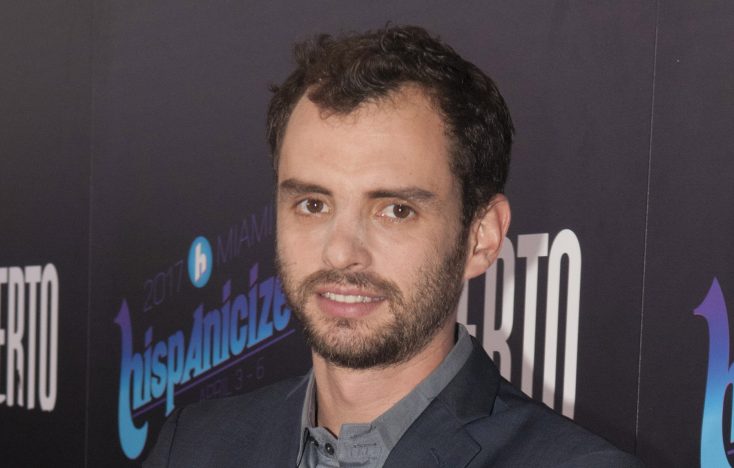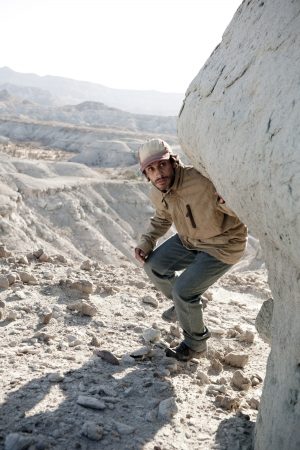By ANGELA DAWSON
Front Row Features
HOLLYWOOD—Jonas Cuaron co-wrote “Gravity,” the Academy Award winning outer space adventure starring Sandra Bullock with his father, Alfonso Cuaron. He now tackles a more down-to-earth problem—the immigration debate—in the chase drama “Desierto.”
Cuaron, who was born in Mexico and educated in the U.S., had been thinking about making a movie about immigration for years but didn’t quite have a handle on how to do it. That is, until he came across Steven Spielberg’s 1971 TV movie “Duel,” in which a motorist is pursued relentlessly on a remote desert highway by a trucker. He decided to make his migration movie about a man seeking vengeance against a man seeking freedom. The film centers on an American pursuing Mexican immigrants scurrying across the border. With his trusty attack dog and a high-powered rifle, this lone-wolf vigilante picks them off one-by-one. The survivors do what they can to escape the killer but in the desert, there is little room to hide, so they do what they can to outwit him.
The young filmmaker tapped Gael Garcia Bernal, best known for his roles in “Y Tu Mama, Tambien,” “The Motorcycle Diaries” and more recently the acclaimed TV series “Mozart in the Jungle.” Bernal, also a Mexico native, knew a little something about the challenges faced by Mexican and Central American residents trying to flee their countries for a better life (or in some cases hoping to reunite with families already settled) in the U.S. He helped create the Amnesty International short film documentary series called “Los Invisibles.”
For the antagonist, Cuaron cast Jeffrey Dean Morgan, best known for playing the Comedian in “Watchmen” and the fearsome Negan on AMC’s “The Walking Dead.”
With Presidential candidate Donald Trump’s vow to build a wall between the U.S. and Mexico if elected, the issue of immigration is top of mind among voters/moviegoers.
The trio spoke about the timeliness of the film and the hope that it opens a dialogue about immigration that will lead to productive solutions.
Q: When did you come up with the idea of “Desierto?”
Cuaron: This rhetoric of hatred, which was already starting 10 years ago in Arizona with all the anti-immigration laws, I felt like I had to make a movie that spoke about it. I didn’t find the right way to do it until a couple of years later when I watched “Duel” by (Steven) Spielberg. I realized that instead of creating a rhetorical piece that spoke about the subject matter, I’d create a horror experience for the audience that would bring them through this journey.
Q: How do you feel about the film coming out during this time with political talk about building a wall and race relations deteriorating?
Bernal: We’ve been discussing this a lot in the past few days. It helps to funnel out an explanation. To me, this film depicts the nightmare of the consequences of hate discourse, of a narrative that criminalizes other groups of people. It only requires one person pulling the trigger to create a massacre. We can see the consequences of that hate speech being put in place in this movie. What we wanted to highlight is the ridiculousness of it all, how we got to this place and to create introspection and open up a discuss that understand migration as a natural phenomenon. It’s something that needs to exist in order for life to exist on earth. Instead of criminalizing it, we should talk about regulating it and legalizing it so we don’t criminalize these people because we’re criminalizing the wrong people. So we need to open the dialogue because everything we do has global repercussions. We need to discuss this issue with much more care and compassion. It isn’t easy; it’s complicated. But it’s definitely more ambitious and benign and will create more goodwill and a sense of common good than the short-sighted electoral way that it’s been managed so far, not only in this country but in many countries around the world, including Mexico.
Q: What did you think when Jonas Cuaron presented you with the script?
Morgan: I met with him in New York. Gael already was attached to it. After talking to (Cuaron) for about five minutes, I knew there was something special about him. He is not only an amazing storyteller and the future for him is way beyond anything I can see. I just wanted to be in this movie to work with Jonas and Gael. As a fan of Gael for years, I looked at is as an opportunity to work with some brilliant filmmakers and an opportunity for me to play a role like I’d never done before. Sam was somebody I’d never tackled and may never again. It was hard. (He laughs.)
Bernal: It was a challenge to make a film where one person is chasing another and there’s no place to hide. It’s a cinematic challenge. As actors, how much dialogue do we have?
Morgan: Hardly any. There’s not a lot of human interaction for either of these characters so it’s a lot about isolation. As an actor, that’s a special kind of challenge to convey to an audience what you’re going through without voicing it. With both characters, you really get in their shoes. That’s a testament to (Cuaron).
Q: What filmmakers or films influenced “Desierto?”
Cuaron: I’ve always been a fan of how ‘70s genre films managed to be very political and in some ways subversive films but they made them in a more mainstream way by hiding the subject matter under the guise of genre. When I was looking for a way to tackle this story, I saw “Duel,” by Spielberg and I knew that was the way to tackle it.
Bernal: I recently watched “Rambo: First Blood,” and the first half-hour is pulsating. There’s something going on—you don’t know what it is but you’re scared to death. By going into a horrific situation of a person who comes back from a war, you can create this horror story. Maybe it could be a genre—political horror.
Q: This movie is the official entry representing Mexico at next year’s Academy Awards. What does that mean to you?
Cuaron: I was very excited when the Mexican Academy selected “Desierto” to represent Mexico in the race to the Oscars, mostly because the movie already has opened in Mexico and was very well received by audiences. But to also have the Mexican film industry embrace it, I’m very excited about it. It’s a movie I have lots of love for. I’m very proud of it. And I want to reach as many people as possible. I think it’s an important movie.
Bernal: It’s a wonderful category—Foreign Film. They receive 75 films from all over the world. In the end, there is only a place for five (finalists). Every year, just look at films that have been nominated in this category, it’s incredible. It’s a very competitive category. Just getting nominated would make such a difference in terms of being seen by a very broad audience. It’s already had an interesting life wherever it’s come out, which is (so far) Mexico and France.
Q: Some in the audience may root for Sam.
Cuaron: I think if you’re rooting for him and think he’s a hero, I don’t think it’s your fault. I think you’ve been bombarded so much by speeches of hatred, you don’t understand the way things really are. We know very little about the character Jeffrey plays but with the little signs he gave us it’s clear that he’s in a vulnerable situation. It’s those vulnerable parts of society, the ones that are looking for an answer as to why their situation is the way it is, when they keep getting bombarded by speeches that claim migrants are to blame. In a country with lax gun control, sooner or later the recipe already is there.
Q: Why did you feel the need to show the dog’s death so brutally?
Cuaron: I’m a real pet lover. Obviously, that scene is hard to watch but we (the audience) just watched it kill two Mexicans and other Mexicans killed in the film. So, to me, it’s just another piece of the story. Also, I wanted to show another side to Jeffrey (Dean Morgan’s) character, which is terrifying, I wanted him to seem human.
Morgan: It’s the one moment in the story where you can humanize Sam. It’s the one relationship that anyone can relate to. That’s it. The rest of it, you should be able to relate or even understand anything that he’s doing.
Q: When people see Sam as an hero and are concerned about a dog’s death over the lives of human beings, what does that say about us as a society?
Morgan: That’s the question we’re posing. The answer is a sad one. We’re finding out every day that it’s a little more sad than we’d hoped.
Q: Gael, did you draw from personal experience to find your character?
Bernal: I wouldn’t have been able to play this character if I hadn’t had the experiences I had doing other films about this issue. I did some short films about migration for Amnesty International. I also did a documentary about a man who was killed in Arizona. I went from Honduras to the United States, following the journey of the migrants. Being close to them and experiencing this and doing all that research for many years allowed me to be able to when Jonas approached me about the project, I told him, “Yeah man, of course I can play this.” I felt I had the elements to be able to have ownership of the character and know I could pull it off.
We wanted to give an added spin to the character. Instead of just crossing the border for the first time like the archetype would establish, we decided to make him a character who’s coming back home. This is a new phenomenon with migration. Because it’s been criminalized, there are so many people who’ve been deported who had been living here (in the U.S.) for years and have family here, they’ve been paying their taxes and incorporating themselves into society and, all of a sudden, because of a traffic violation, they get into this loophole of self-deportation. It’s terrible. It’s a movie in itself. There’s like an emotional blackmail. Some of the people I worked with on the documentary had daughters in the U.S. They didn’t know what to do—risk trying to go to the U.S. or bringing their family back to Mexico.
It was a very delicate balance. With cinema, you can vandalize an issue and exploit something if you don’t do the (research). You have to feel the ownership to tell the story.






